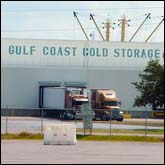 Usually criminal export defendants are in the dock for exports of night vision, stun guns, or high-tech chemical processing equipment. Today we have criminal defendants who were indicted for exporting insufficiently chilled chickens from Pascagoula, Mississippi to Russia, proving, I suppose, that even exporting chickens can be a dangerous business these days.
Usually criminal export defendants are in the dock for exports of night vision, stun guns, or high-tech chemical processing equipment. Today we have criminal defendants who were indicted for exporting insufficiently chilled chickens from Pascagoula, Mississippi to Russia, proving, I suppose, that even exporting chickens can be a dangerous business these days.
The indictment describes an alleged conspiracy by the three defendants, all employees at Gulf Coast Cold Storage, to remove dressed chicken carcasses from blast freezers before they had reached certain temperatures required by the trade agreement between the U.S. and Russia. In other instances, the defendants were alleged to have put chicken that reached higher than permissible temperatures back into the blast freezers.
Why, you must be asking, is the U.S. concerned about exports of warm chickens to Russia? Can they be weaponized into chicken wings of mass destruction? Will the warm chickens be served, pathogens and all, to Russian political prisoners? No, the warm chickens became criminal export violations through the wondrous intervention of the federal prosecutor’s jack-of-all-trades and catch-all statute, 18 U.S.C. § 1001, a/k/a the Martha Stewart law, which can transform almost any activity otherwise legal under U.S. law into a federal crime. Just as Martha Stewart went to jail for lying about perfectly legal activities, so the Pascagoula Three risk jail time for an allegedly untrue statement on an export certificate with respect to processing techniques that would not themselves have violated U.S. law.
When required by importing countries, as is the case with Russia for poultry exports, the Food Safety and Inspection Service of the U.S. Department of Agriculture will issue an export certificate attesting that the product complies with the importing country’s requirements. The exporter fills out an application for that certificate on FSIS Form 9060-6 which has a certification at the end that “the product covered by this application for export meets the inspection requirements for the country of destination.” This was the alleged false statement that served as the basis of the 18 U.S.C. § 1001 charge.
In order to sustain a conviction under 18 U.S.C. § 1001, the prosecution must demonstrate that the defendants knew that their statements were false. United States v. Yermian, 708 F.2d 365 (9th Cir. 1983). Here that means that the prosecution must show that three guys working in a blast freezer in Mississippi were familiar with Russian law on chicken processing. That seems to be a heavy burden, although the indictment suggests that one or more of the defendants told others to report false chicken temperatures, which I suppose will be argued as proof that they knew the temperature requirements of Russian law.
And the moral of the story? It’s this: there is no product so benign or inconsequential that someone can’t figure out how to send you to jail for exporting it.
 Permalink
Permalink
Copyright © 2012 Clif Burns. All Rights Reserved.
(No republication, syndication or use permitted without my consent.)

 Posted by
Posted by  Category:
Category: 

